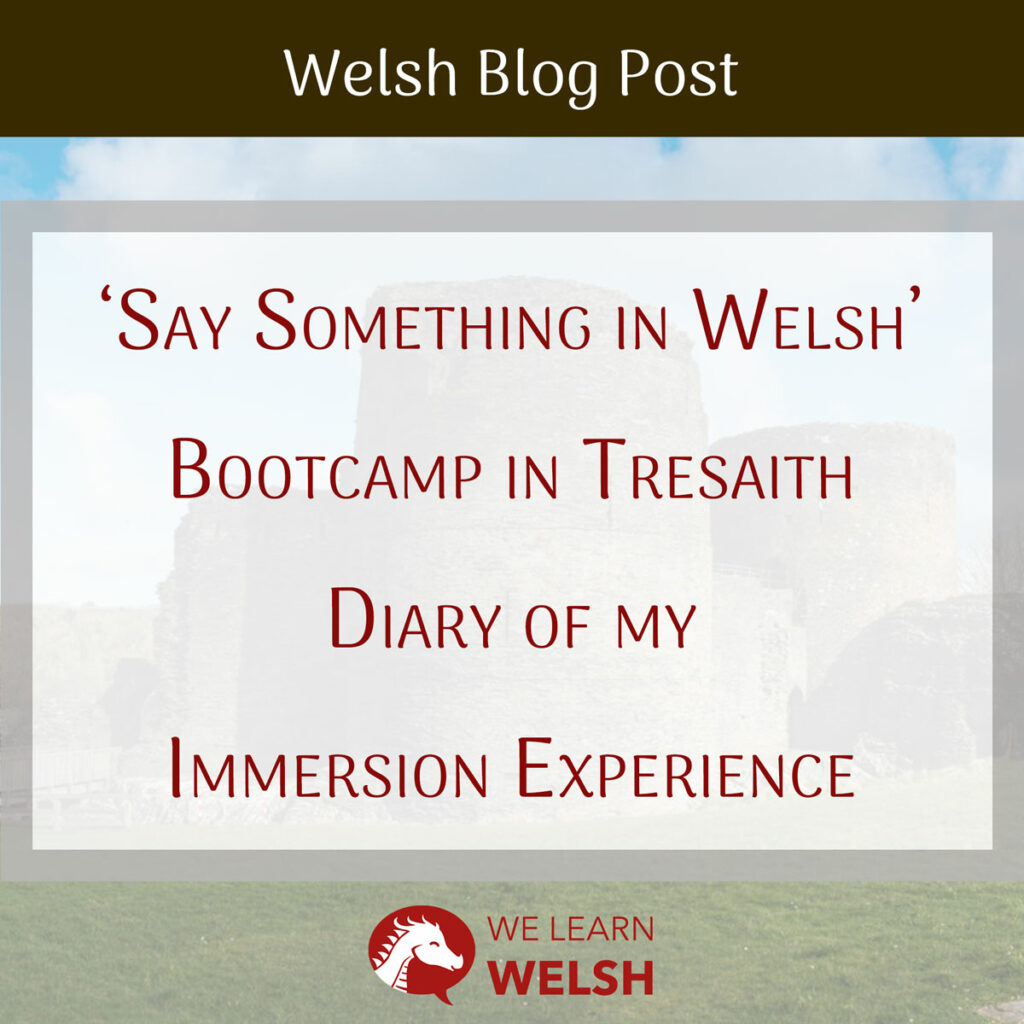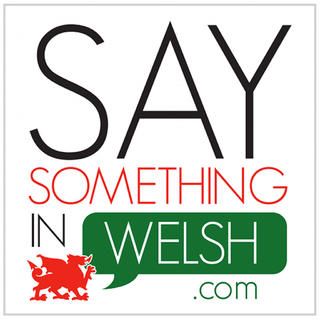Important: This article was originally written in 2019, back when Say Something in Welsh was still running its annual learner bootcamps. Although these events are no longer held, I wanted to share this experience with you all in our newsletter, as it was a turning point in boosting my confidence in Welsh at the time. If you’re looking for a similar immersive experience, I highly recommend checking out the immersion courses offered by Garth Newydd.
Anyone who knows me is well aware that I love languages, so much in fact that I spent six years living and breathing the Japanese language, another six years living in Italy (where I met my wonderful husband Mathieu), and as of this summer, four years studying what the Welsh fondly call “iaith y nefoedd” – the language of heaven.
The problem with studying Welsh however – especially in the very anglicised part of Wales that I call home – is that chances to fully immerse yourself in the language are few and far between. I do take a regular language class with other learners, and participate in local Welsh activities whenever I can, but it hasn’t been enough to launch me to the level of fluency I reached in Japanese and Italian. And that, as a linguaphile, frustrates me to no end.
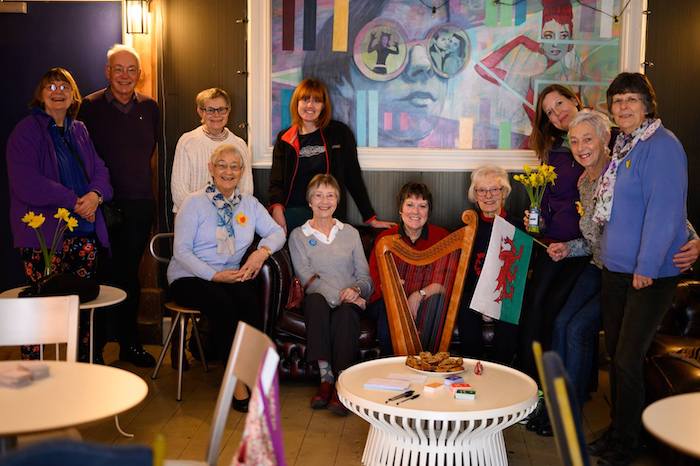
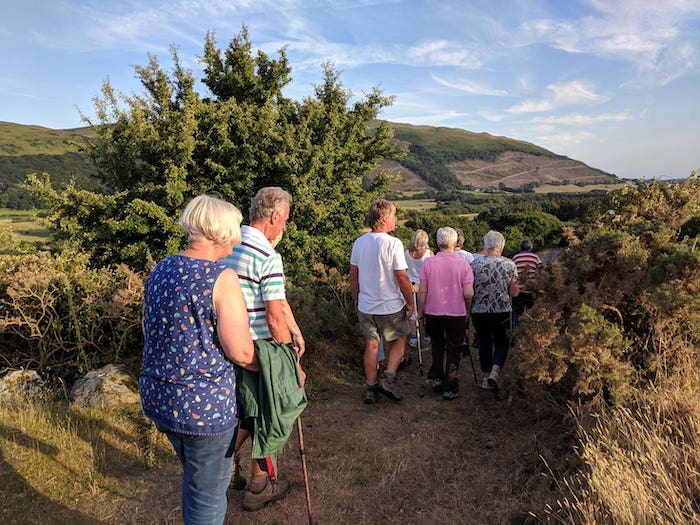
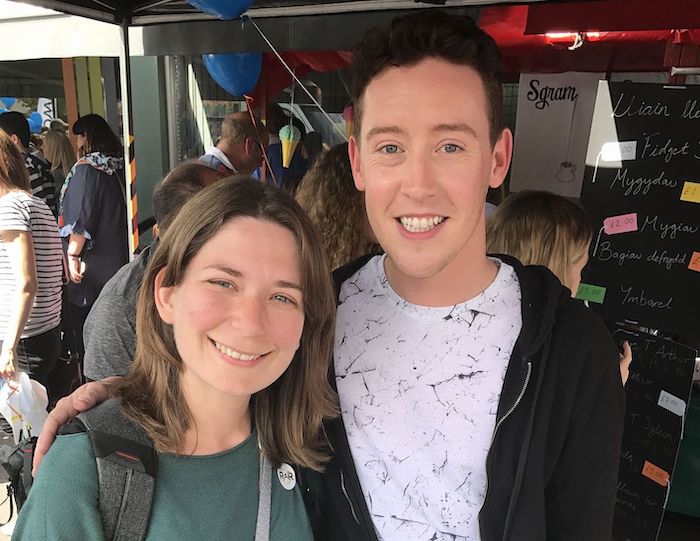
It was for this reason that I made the decision to sign up for the June 2019 edition of the ‘Say Something in Welsh’ Bootcamp (Bwtcamp) a couple of weeks ago. Usually these week-long language holidays are fully booked within a day or two of being announced, but by an incredible stroke of luck, or perhaps fate, one place opened up following a last-minute cancellation. It was now or never – I knew I had to grab the opportunity before fear or doubt could sink in!
What underpins the SSIW Bootcamp experience is the “no English” rule. Dictionaries are discouraged, as is the question, “Beth ydy’r gair am…?” (What is the word for…?) If you want to get your message across, you have two options: explain the word using other words or, if all else fails, rely on gestures or drawings. This simple yet effective rule allows the SSIW team to replicate the full immersion experience of living in another country, while giving learners the satisfaction of learning and consolidating a wealth of language in a very short period of time.
Now that I’m sitting here, bags fully packed and pre-departure to-do list checked, I do feel the nerves slowly starting to build, but I’d like to think that they are nerves of excitement rather than anxiety. As with all my other language learning experiences, I know I won’t really settle down until I’m finally there amongst my fellow bwtcampers, bumbling through new Welsh sentences and generally having a good time making a fool of myself!
As a note of interest, because this is the budget version of Bootcamp, we’ve been asked to bring a lot of things one generally wouldn’t think to pack on holiday. These include our own bedding, toiletries, towels, a drying-up cloth for dishes, and even special cooking ingredients if we want to make an exotic meal in the evening. (As you might have guessed, Tresaith has no local shops!) Somehow ‘swimsuit’ also found its way onto the essentials list … so my plan is to pretend not to understand any Welsh if someone tries to coax me into the sea! The suggestion to bring a torch also intrigues me. Are there some night hikes in store, or do they simply want the reassurance that you’ll make it to the toilet without incident in the middle of the night? I guess I’ll find out soon enough! 😉
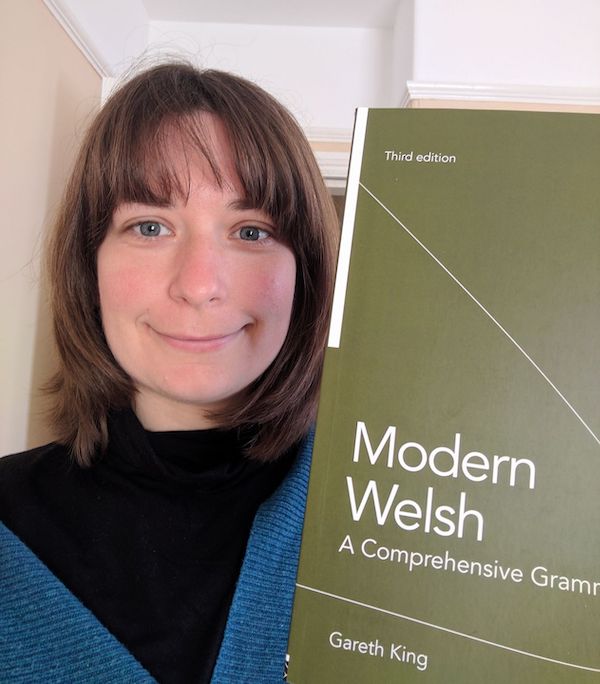
Day 1 – The Arrival
Mathieu and I could tell that Saturday was going to be unusually warm and sunny for Wales the moment we left the house, so we made the spontaneous decision to stop in Cei Newydd (New Quay) on the way down to Tresaith and jump on a one-hour dolphin spotting boat trip. Although the scenery was lovely, only a couple of dolphins actually breached the surface. We had just enough time to fit in lunch and an ice cream before hopping back in the car and heading down to Bootcamp.
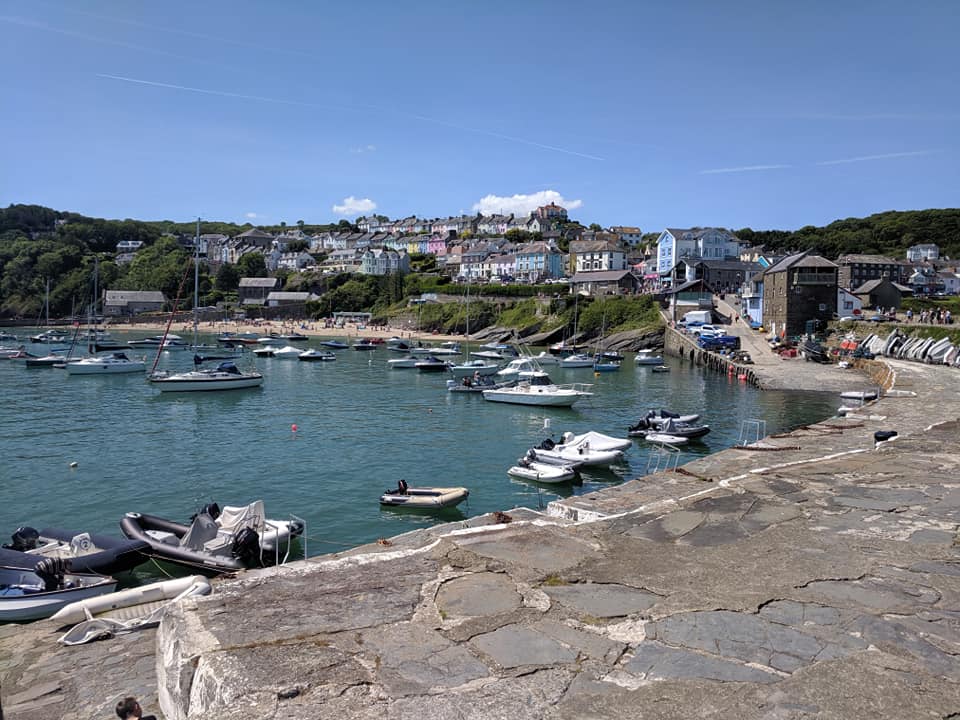
Tresaith is a tiny coastal village located on a steep incline just 15 minutes south of Cei Newydd. It is very popular with holidaymakers thanks to its sandy beach and secluded location. Despite its small size, it took us a few trips up and down the hill and the help of some kind tourists from London to figure out the exact location of the Canolfan where Bootcamp would be taking place. We weren’t late, thank goodness, but by the time I arrived, most of the Bootcampers had already settled in the living room, drinking tea and exchanging their first (and final) few sentences in English.
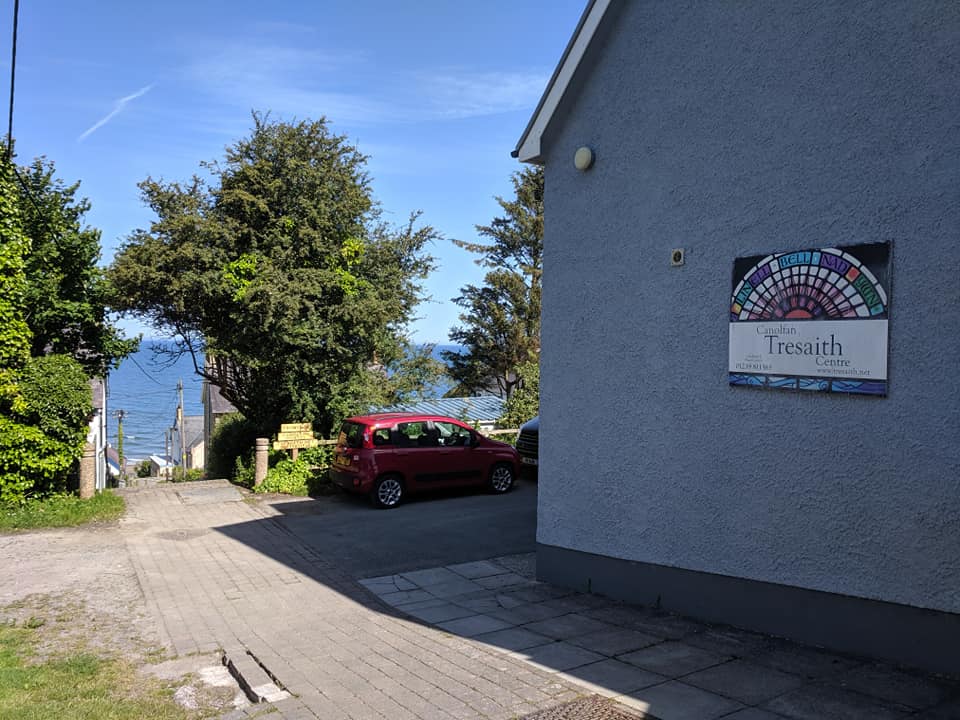
Iestyn, the leader and southern voice of the SSIW online course, began by explaining the rules of Bootcamp, the two most important being to a) have fun and b) to speak Welsh at all times, no matter the circumstances. He also introduced the concept of the “pea box” – that is, whenever we manage to push ourselves out of our respective comfort zones, we must drop a dry pea inside a plastic container. If, at the end of the week, there are loads of peas in the container, it means we have actively learned lots of new things.
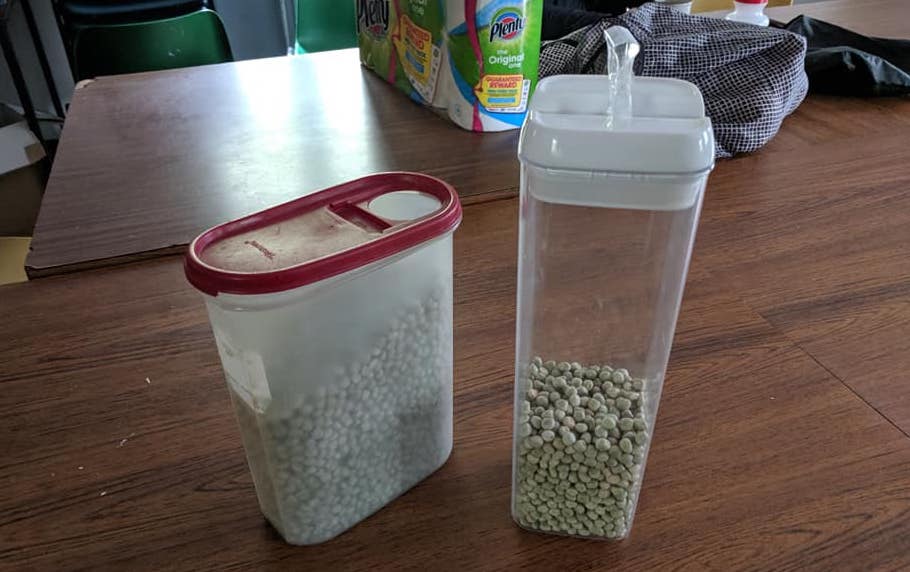
I have to say that the level of Welsh is far higher than I’d anticipated. Anyone who has conquered Level 1 of SSIW is eligible for Bootcamp, but it’s quite clear that we have all studied beyond this basic requirement, which has allowed us to have fairly deep conversations and play with the language. What’s even more clear is how passionate we all are about Welsh. Some bwtcampers come from a Welsh background and regret not being brought up in the language, whereas others are simply passionate about language learning as a hobby. Amazingly this isn’t the first Bootcamp for two of the participants – Colin and Lea loved it so much the first time that they decided to come back for seconds!
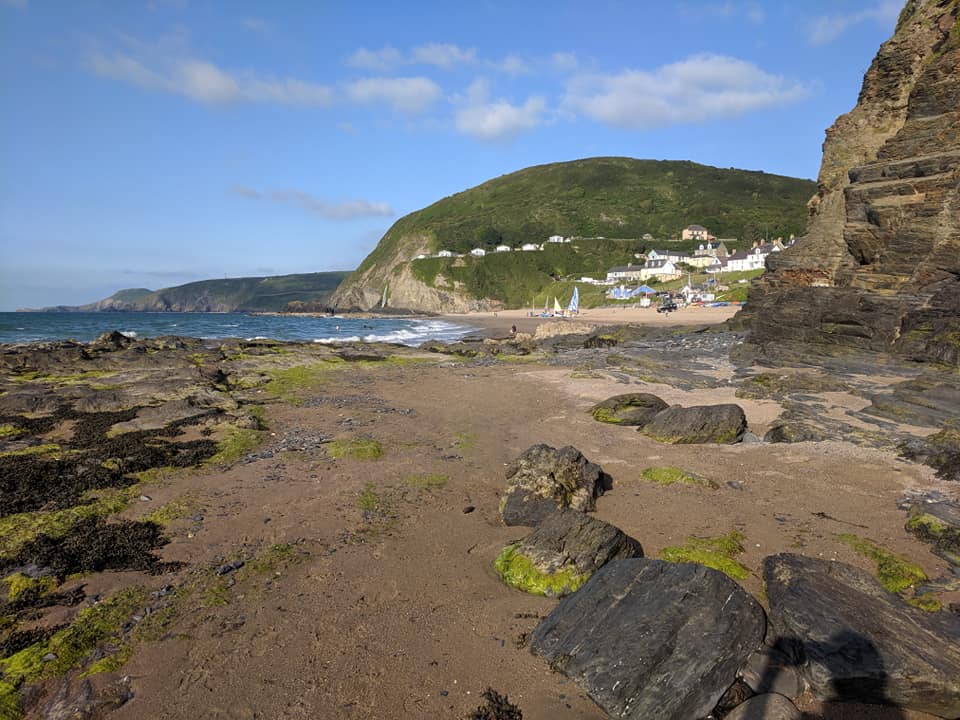
Speaking of seconds, in the evening we all tucked into a very nice pasta dinner prepared by Iestyn and Dee and a range of desserts including brownies, chocolate cake and crumble with custard. This was followed by a trip down to The Ship (Y Llong) for drinks – a nightly tradition according to Iestyn and Colin. Being the day after the summer solstice, the sky was still glowing even as we wended our way home at 11pm.
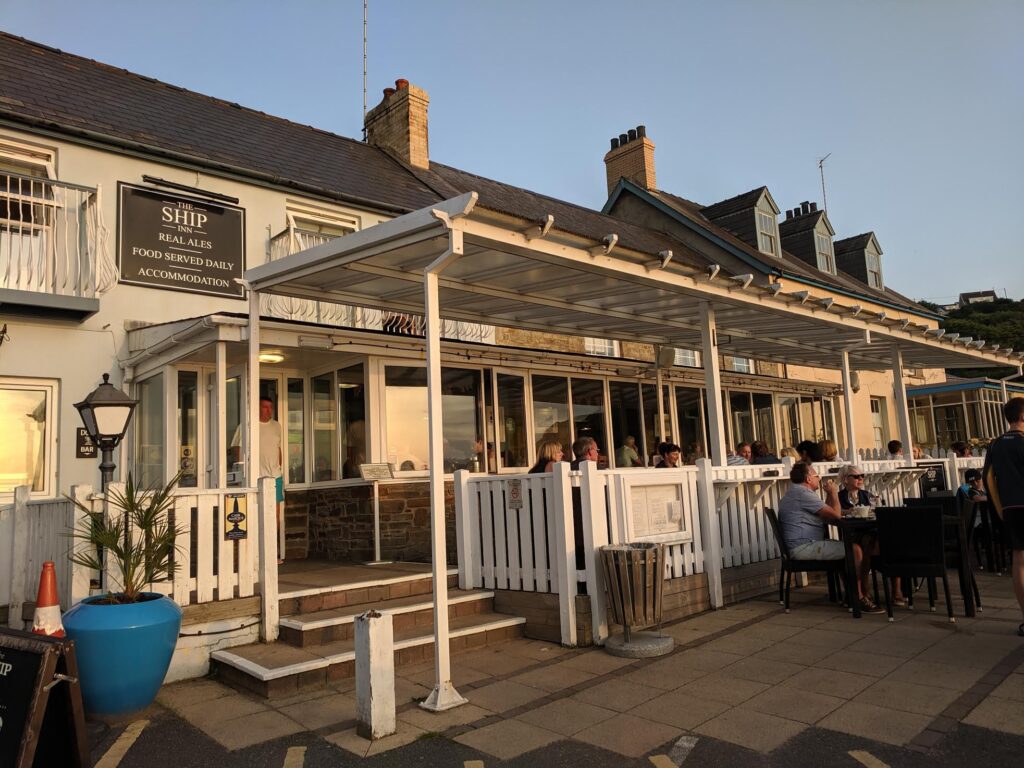
What I found most interesting about day one was how much of the southern dialect I was able to understand despite living in the north. Things like “Sa i’n gwybod” instead of “Dw i ddim yn gwybod” and “moyn” rather than “eisiau”. I can only put this down to my exposure to southern characters such as Jac and Carys on the Welsh soap opera Rownd a Rownd. Iestyn mentioned at one point that many northern speakers wind up speaking like southerners after a week in Tresaith – as a proud Gog, I feel I should resist!
Day 2 – Tresaith Beach and Llandysul
Day two began at the crack of dawn, with a quick shower in the rather intimidating communal bathroom and a chat with Iestyn’s seven year old daughter who – kudos to her – never switched over to English while speaking with me. It looks like her dad has taught her well!
Our first stop was Tresaith beach where we split off into small groups and used washed-up materials such as rocks (creigiau), seaweed (gwymon), shells (cregyn) and driftwood (broc) to create drawings in the sand. Our group, which consisted of Colin, Deborah and myself, began with the lofty ambition of designing an octopus but we soon realised our artistic limits and ended up cobbling together a fish instead. At one point, an overzealous dog came zipping over with a ball in its mouth, almost trampling our design, so Colin cheekily threw the ball in the direction of another group. (Unsurprisingly they threw it straight back at us!)
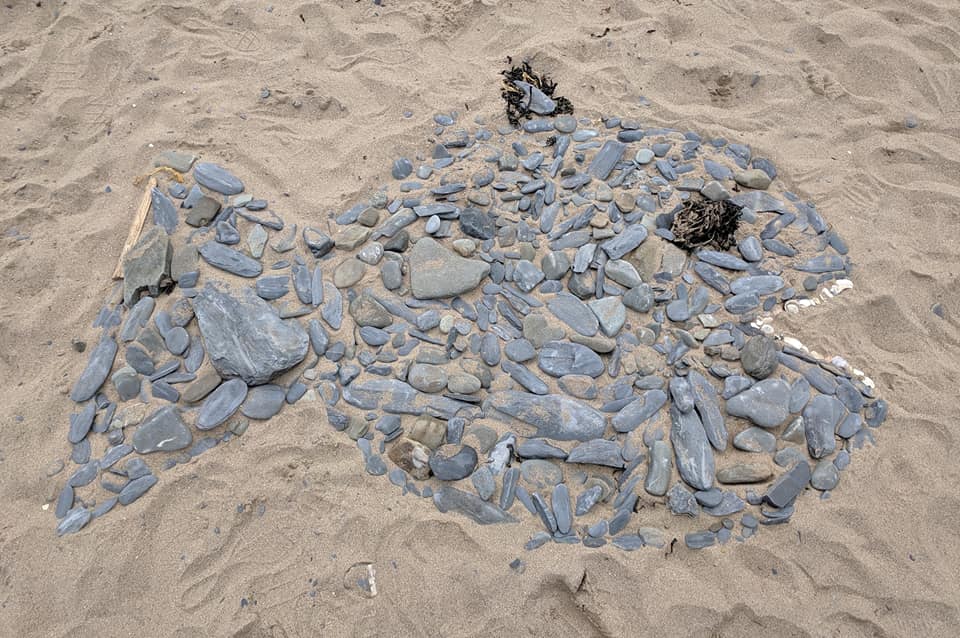

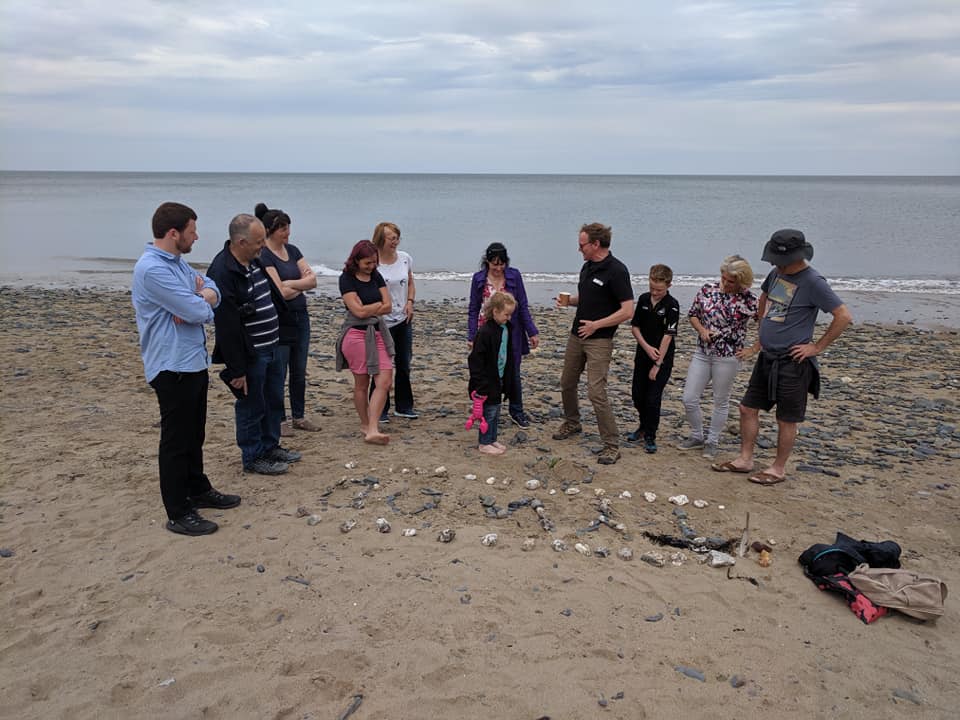
Afterwards we walked over to the northern part of the beach to photograph a fantastic waterfall. I just wish I’d brought a better lens for my camera!
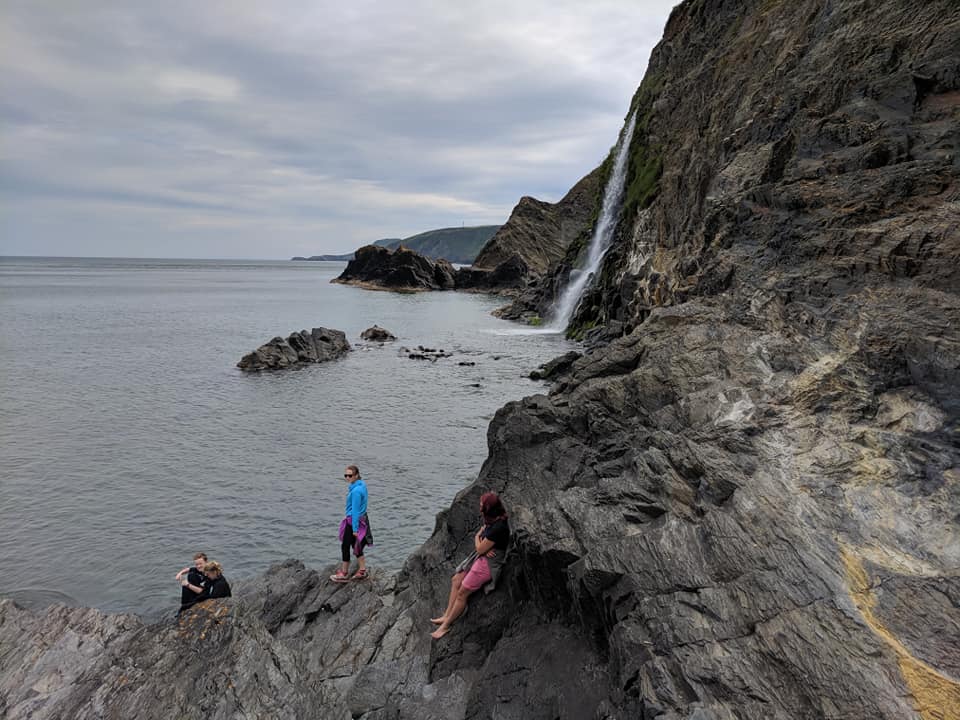
Next we hopped into the car and drove around 20 minutes away to Llandysul for Sunday lunch at a local pub. By that time, I was starving (llwgu) so I left the talking to everyone else in the group and focused on listening as I tucked into my salmon and veg.
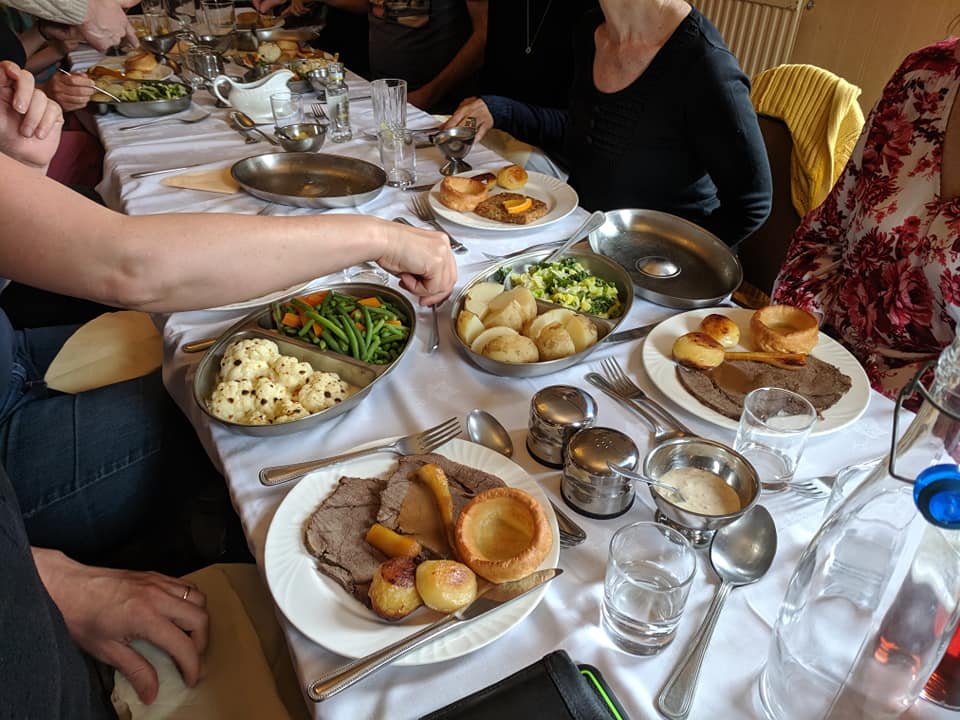
The final activity of the day was a Welsh language church service. Now, I’m not in the least bit religious, but I found it a great experience being able to listen to a service in another language and understand 90% of what was going on. It was very relaxed atmosphere, with lots of games and singing, so I can see why the community enjoys attending. This is also where we met Iestyn’s wife, Cat, for the first time. She had just returned from London where her other daughter had auditioned for a film role!
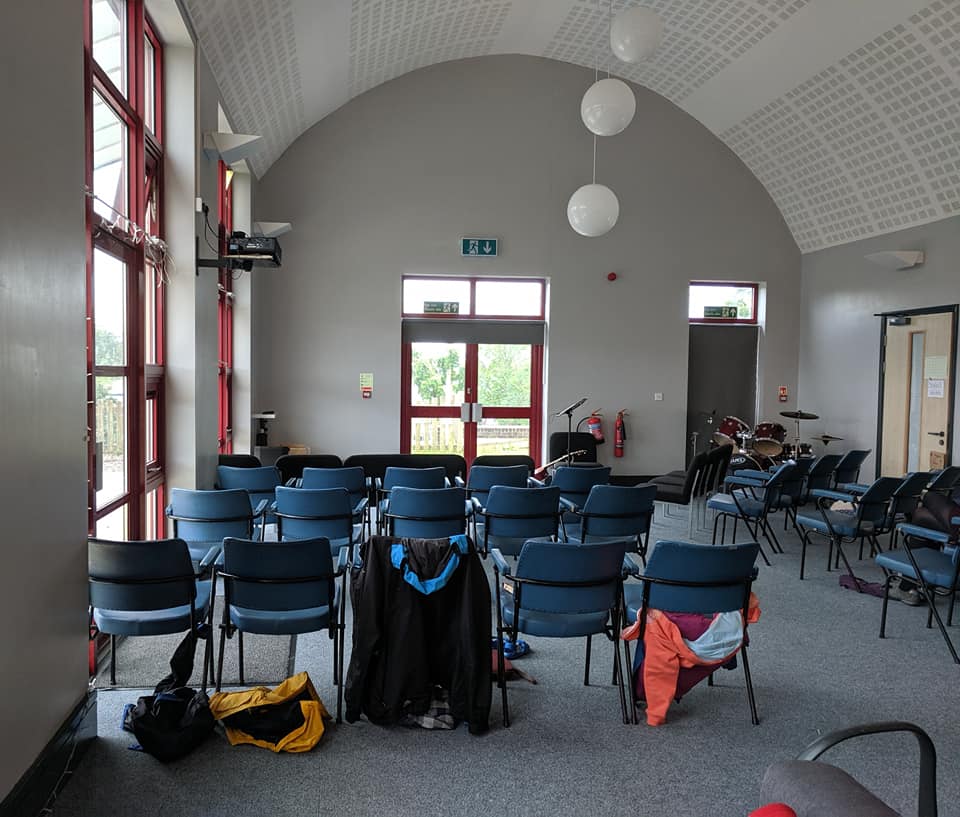
No sooner had we left the church than we noticed a large yellow van blocking Dee’s car. A disgruntled woman then appeared from the adjacent flat, hollering across the car park in English about how we’d taken her parking spot. (We had no idea since the spots weren’t clearly marked!) That was the first time we had to break the “no English” rule by yelling back in our defence – hopefully it won’t happen again!
The rest of the day was spent back at the Canolfan, munching on tapas and chatting about our lives and interests. For the first time since I began learning Welsh, I found myself being able to say things with a degree of fluency, whereas normally I end up dwelling on the grammar before I open my mouth. Is it possible that I’ve “levelled up”? 😅
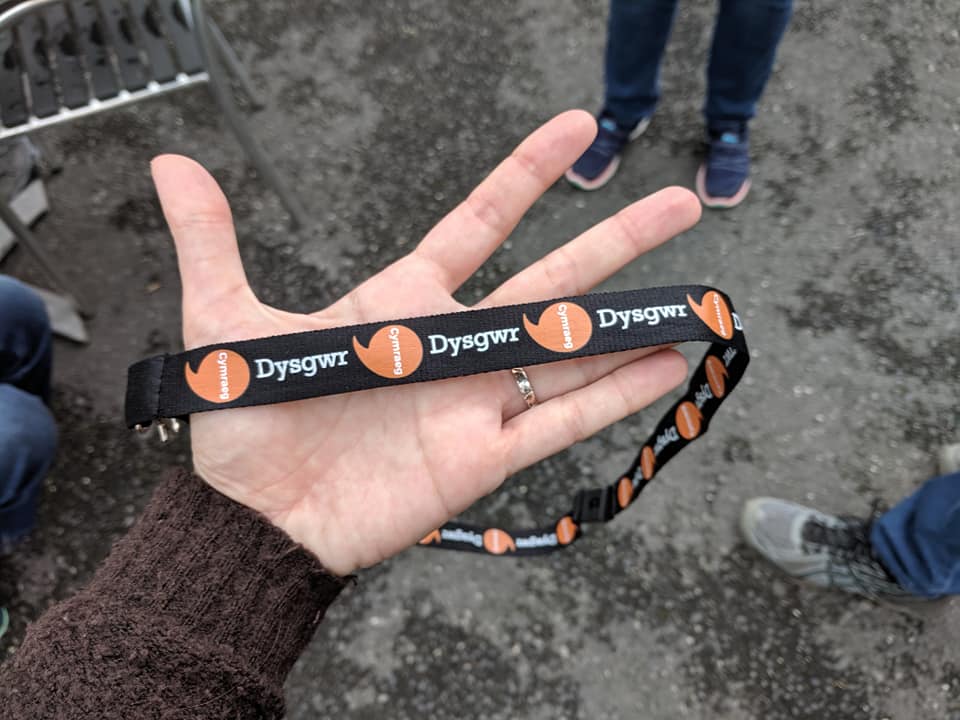
When everyone else went out to the pub, Kathryn and I stayed back so I could show her the Anki app I use to memorise vocabulary. I also had a quick chat with Dee and it turns out she’s a fellow linguaphile – not only does she have Welsh under her belt but she can also speak excellent Spanish, as well as some French, Italian and the Basque language!
The funniest part of the day was when Colin called his bed a “gwely cyhoeddus” (public bed) rather than a “ gwely cyffordus” (comfortable bed). I’m sure none of us will ever mix up those two words ever again!
Day 3 – Cwmtydu, Pot-sian and Llangrannog
Contrary to when I’m at home, I actually enjoy getting up early when I’m on holiday, and Bootcamp has been no exception. By 8am, I’d had my shower, studied my Anki vocabulary, had my breakfast, and written most of yesterday’s diary entry.
The first official activity of the day didn’t start until nearly 11 a.m. Iestyn invited us to join him in a circle and play a few games to exercise our vocabulary and listening skills. The action games were particularly funny, especially the one where Iestyn would name two body parts in Welsh and using only those body parts, we’d have to touch someone else in the room. So for example, if he said ‘elbow’ and ‘hand’, we’d have to put our hand on someone else’s elbow. The result was a lot of yoga-like poses, especially when he said ‘head’ and ‘feet’! 🤣
Deborah and I then volunteered to make sandwiches for our afternoon picnic in Cwmtydu, a small cove where smugglers used to hide their contraband. It was such a quiet and peaceful spot that you could hardly imagine someone using it for anything else other than sunbathing or swimming, despite its unscrupulous history.
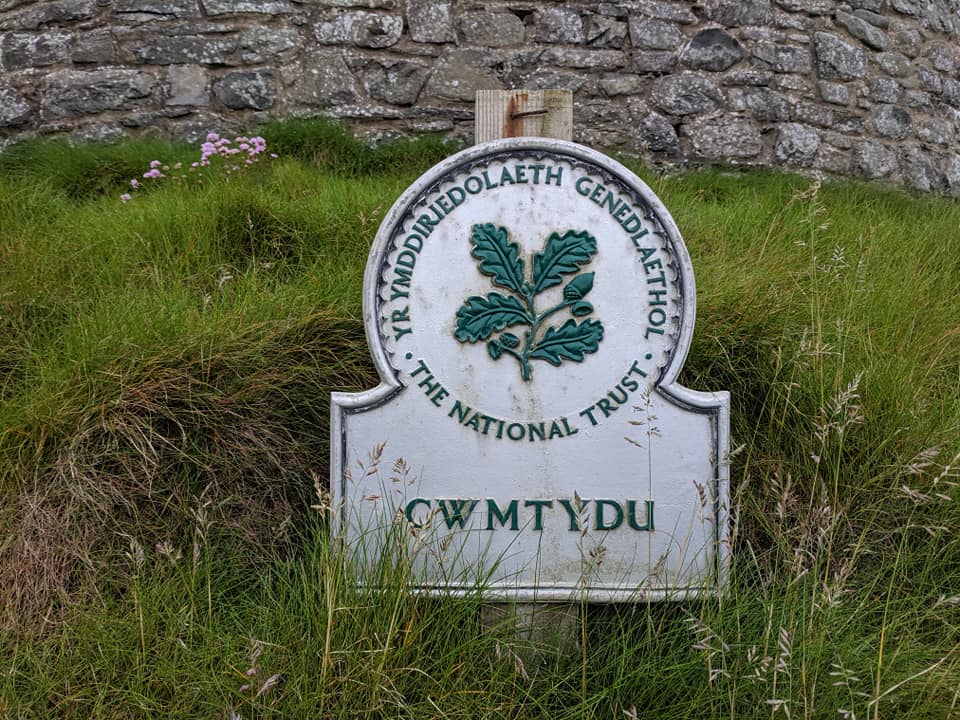
Our next stop was Pot-Sian, a charming pottery studio in Caerwedros, where we painted pottery under the guidance of Welsh artist Sian. (I’m pretty sure Pot-sian is a play on words for potsian, which means to “potter or mess about with something” in Welsh.) I chose a starfish (seren fôr) whereas most other people went with cups and, interestingly enough, owl ornaments. At one point, Iestyn turned to Sian and said, “We have a German, Canadian and Australian here today: I bet you won’t be able to guess who is who from their accents!” A nice compliment, to say the least!
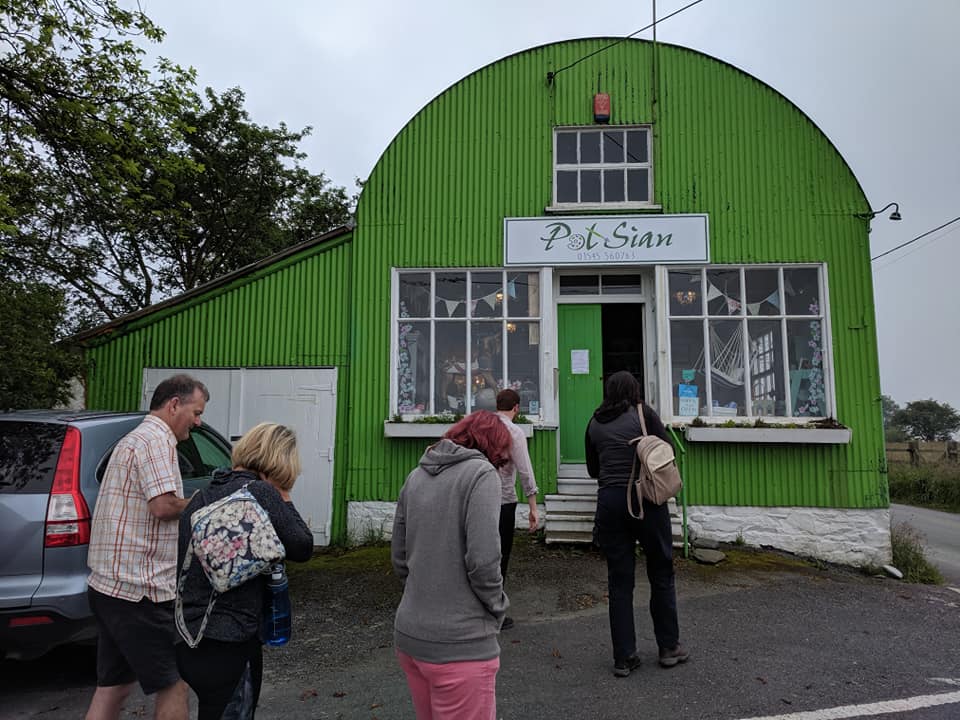
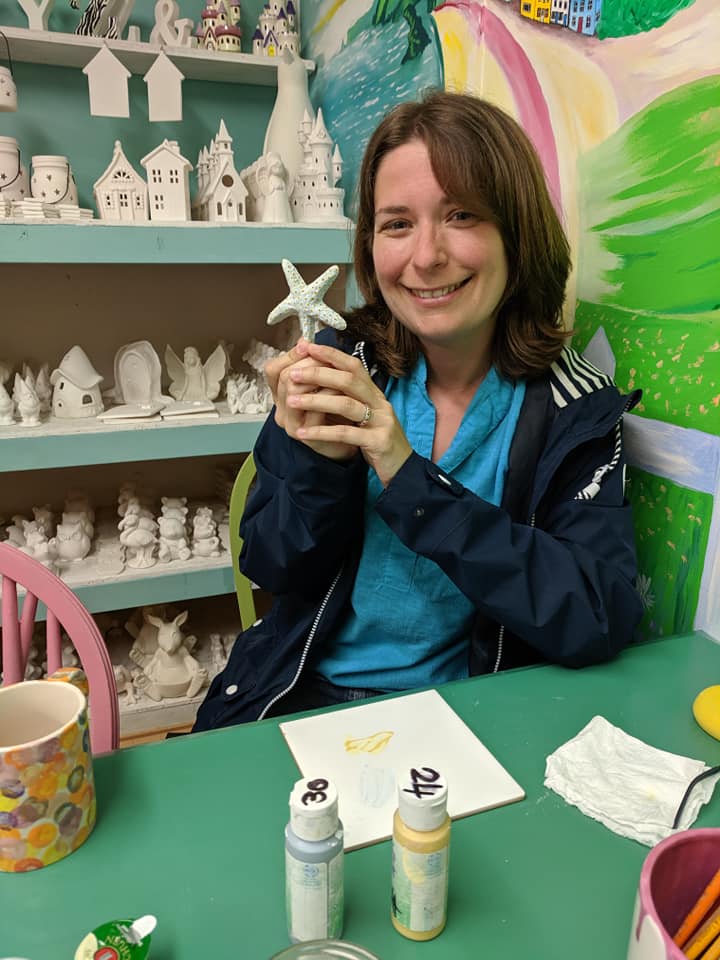
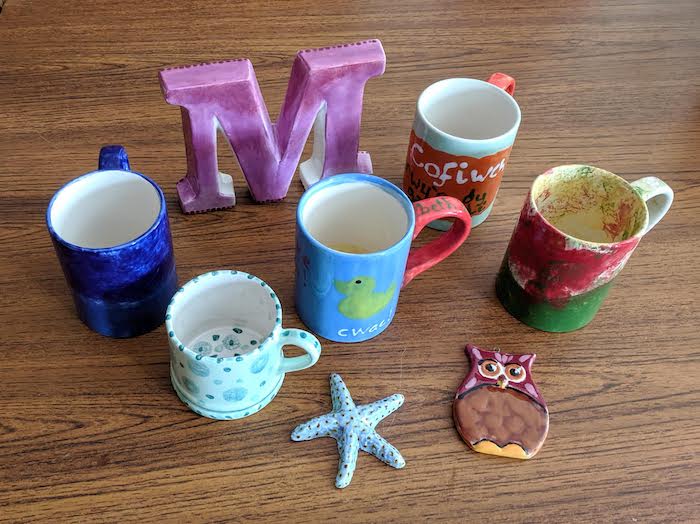
Finally we ended up in Llangrannog, a small seaside town just south of Cei Newydd, where we indulged in ice cream and cake by the beach. It had been cloudy up until then, so everyone was relieved when the sun reappeared.
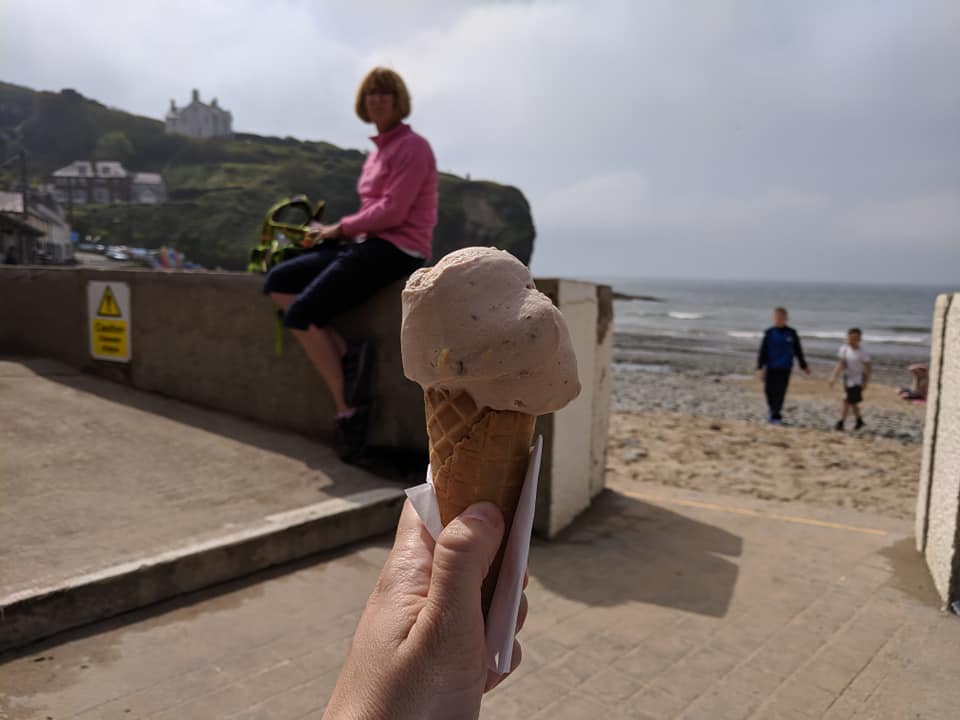
From there, we walked three miles of the Wales Coastal Path back to Tresaith, which consisted of a series of hills travelling up and down the coast through fields and woodland. It was absolutely magical, but being so hot and humid, we all needed a good shower by the time we got back to the Canolfan!
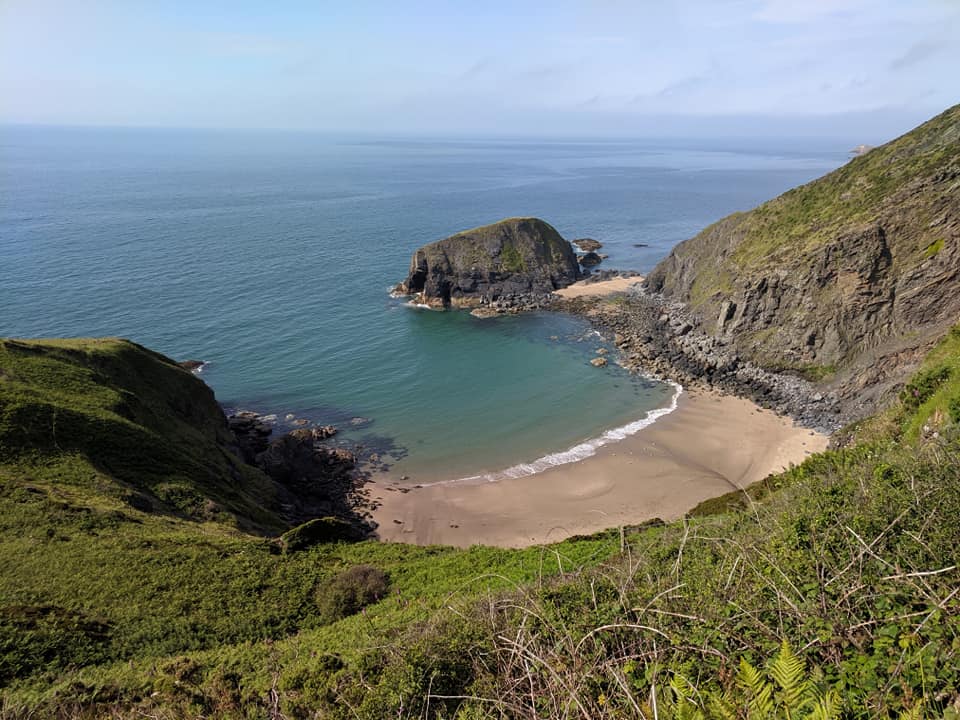
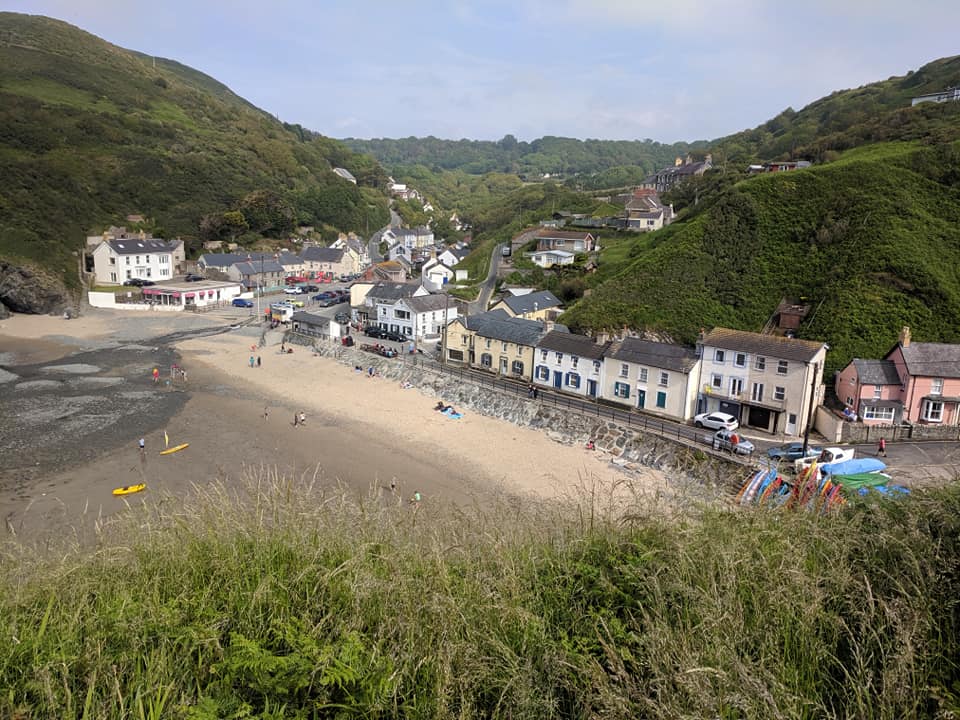
The rest of the evening was very relaxed once again. Deborah prepared gin and tonics, while Colin and Lea took it upon themselves to make supper for the whole group. In the meantime Nia arrived as a substitute for Dee, who is away for a couple of days in Cardiff on business. I already know Nia quite well since we did Ras Yr Iaith (The Language Race) together and she doesn’t live too far from Tywyn. It was nice to see a familiar face!
As for my Welsh, I think I can feel all the puzzle pieces coming together quite quickly. Things I used to have difficulty producing in conversation, such as the infamous ‘yeses and nos’, are starting to flow more naturally. Funnily enough, what exhausts me isn’t so much speaking the language itself but the fact that I’m socialising much more than usual. It’s hard work for an introvert but it’s also worth every minute. 🙂
Day 4 – Castell Emlyn and The National Wool Museum
Yesterday I ended my diary on a positive note but today, I definitely feel like I’ve taken one step forward and two steps back. Even though I was able to understand most of the Welsh I encountered, my brain and mouth simply refused to connect when it came to speaking. Every utterance that emerged from my mouth sounded like gobbledygook. Now, I’ve experienced days like this in all of the languages I’ve studied, so it comes as no surprise. We can’t be bright-eyed and bushy-tailed all the time! Plus I know that these so-called “plateaus” are necessary for the brain to process the new information it’s learned, and prepare itself for the next jump. All I can do is hope that I feel a bit brighter tomorrow.
The day itself was very pleasant. It started off with a visit to Emlyn Hotel in Castell Emlyn where we met Gwyneth of Menter Iaith Gorllewin Sir Gâr for tea and coffee. Her challenge – if we chose to accept it – was for us to walk around town with a sheet of ten questions about Castell Emlyn and ask shop-owners for the answers in Welsh.
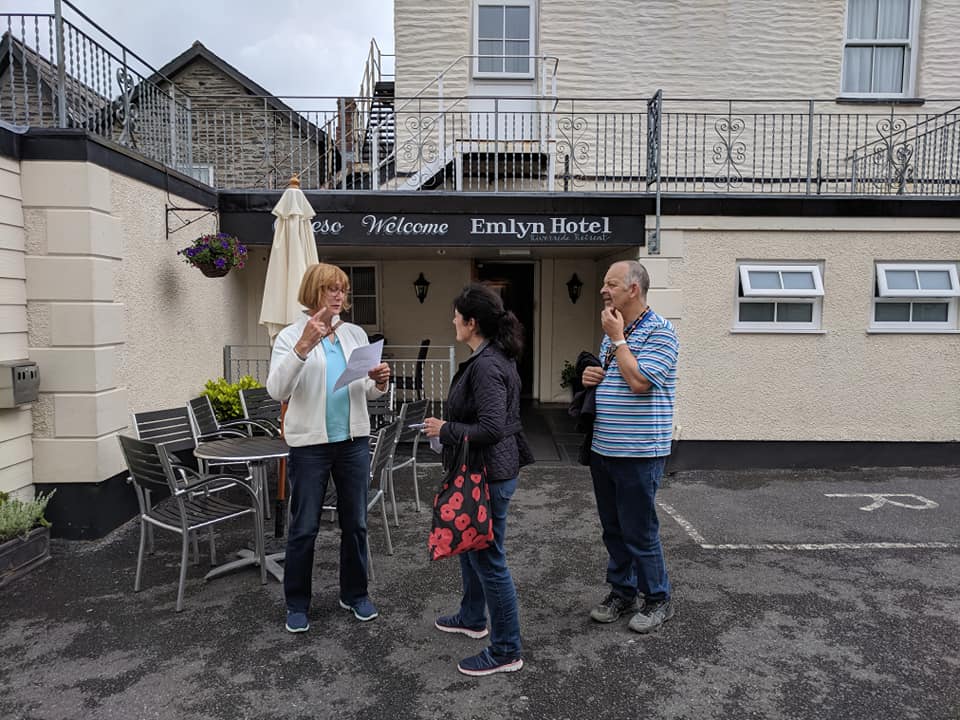
Iestyn also supplied us with some handy SSIW business cards with the following written upon them:
“I have learnt Welsh online. This week I am becoming a Welsh speaker. To do that, I am only allowed to speak Welsh all week. Please help me by either calling a Welsh speaker to help, or by joining in the fun and trying your best to understand my Welsh with sign language. Diolch yn fawr iawn!”
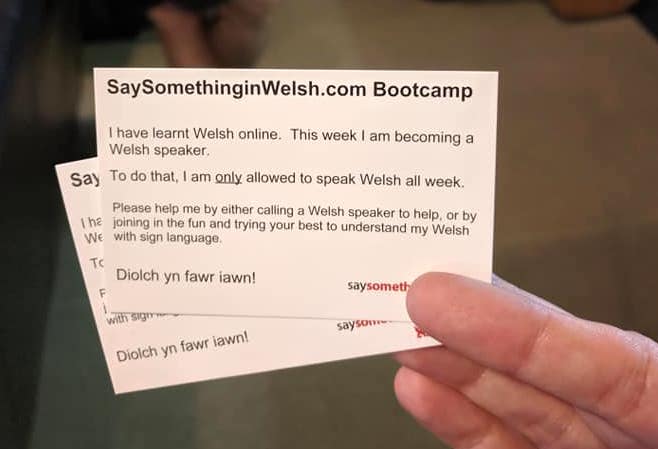
Michelle and I paired up but it took a few failed shop visits before we finally managed to find a fluent (and very patient) Welsh speaker, who thankfully directed us to other Cymraeg-friendly shops in town.
Our next stop was the Amgueddfa Wlân Cymru (National Wool Museum) in Drefach Felindre where we took part in a guided tour of the looms and machinery with a lovely lady who spoke in quick but very clear Welsh. It was at this point that I noticed some of my fellow bwtcampers starting to flag as much as I was. In a way, it’s nice to know that I’m not alone in feeling exhausted.
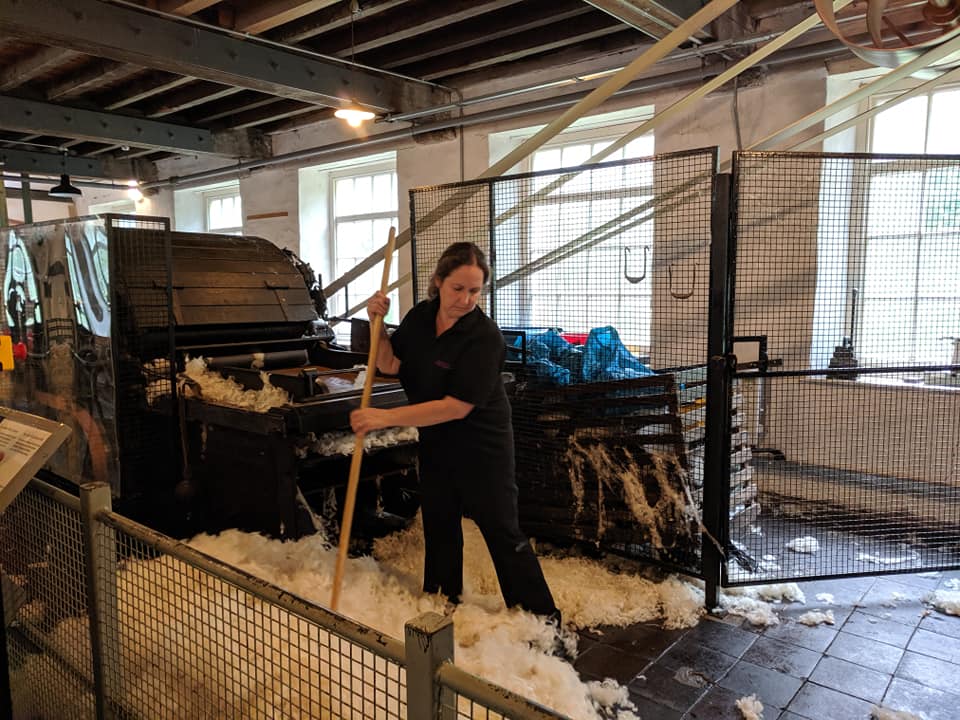
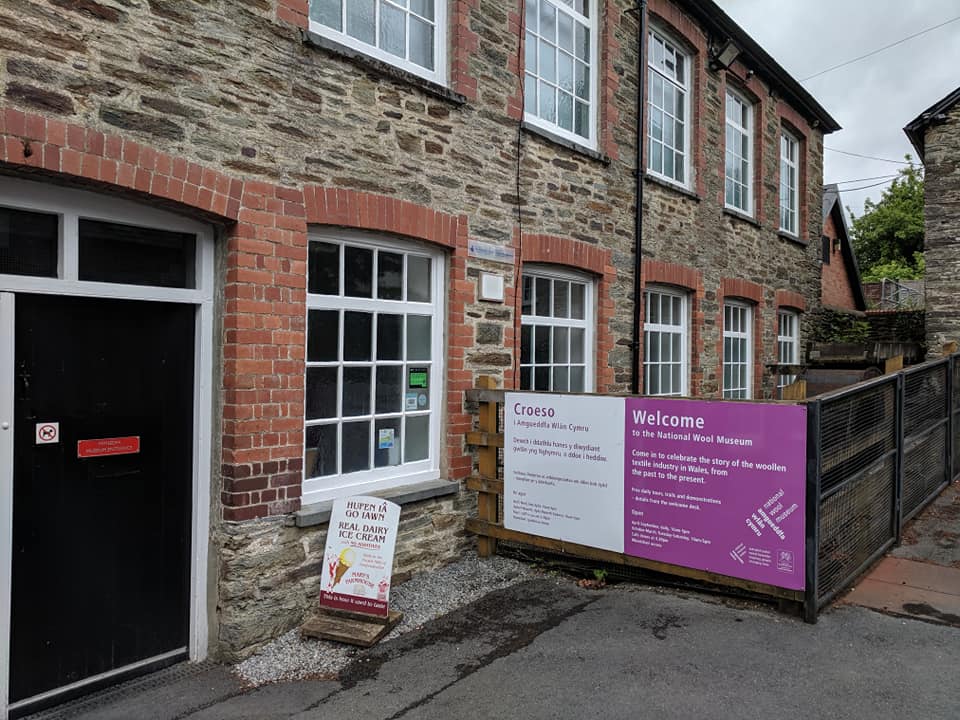
Tesco was the next stop for Deborah, Kathryn, Michelle and me since we were in charge of cooking supper that evening. We also stopped at the butcher in Aberteifi where Kathryn was absolutely convinced they all spoke Welsh. It turns out that only one of them does, and he was on the phone in the back when Deborah went in to buy sausages – yet somehow she still managed to complete her order without switching into English! Chwarae teg iddi!
The day ended, as most days do, with a trip to the “dafarn”, but instead of visiting Y Llong, we drove to a cosy inland pub called Penllwyn Du for an evening of singing popular Welsh tunes. Iestyn, who has a fantastic voice, led the singalong accompanied by the talented Rhian on the piano. I knew around 75% of the songs from the concerts my dad’s choir puts on in Tywyn, so it was easy to follow the words on our handouts without worrying too much about the melody. My favourite is Cyfri’r Geifr (Counting the Goats) because it gets faster and faster the more verses you add to the song. If you’re learning Welsh and want to impress your English friends, that’s the one to sing!
Day 5 – Castell Henllys and Aberteifi
As soon as I opened my eyes in the morning, I instinctively knew that things would be better than the day before. There is something about a good night’s sleep that clears the cobwebs away!
First we drove to Castell Henllys, an Iron Age fortress and museum just a few miles down the road from where Kathryn lives. For a very reasonable £4, we received a tour of the 2000 year old settlement with enthusiastic guide Owain who, despite the muggy conditions, made the effort to dress up in the woollen robes of the prehistoric Celts who lived and worked the land. Looking back, I’d say I understood about 70% of what was said, and if I’d known some of the technical terms, that could have been as high as 90%. It was already 1 p.m. by the time we finished, so we decided to have ‘cawl’ at the museum cafe, and thankfully it was delicious.
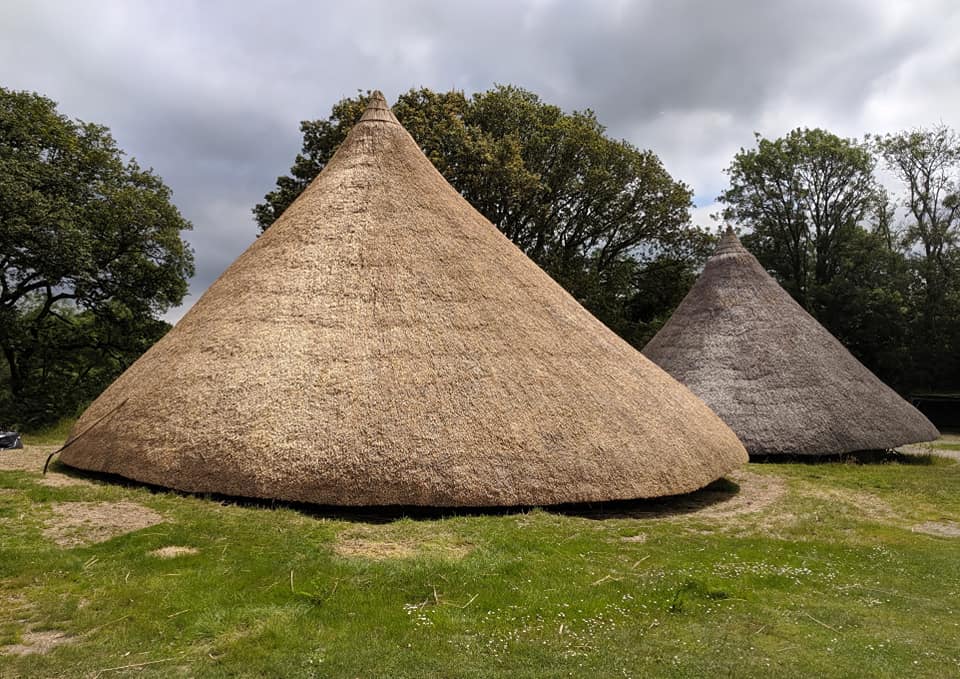
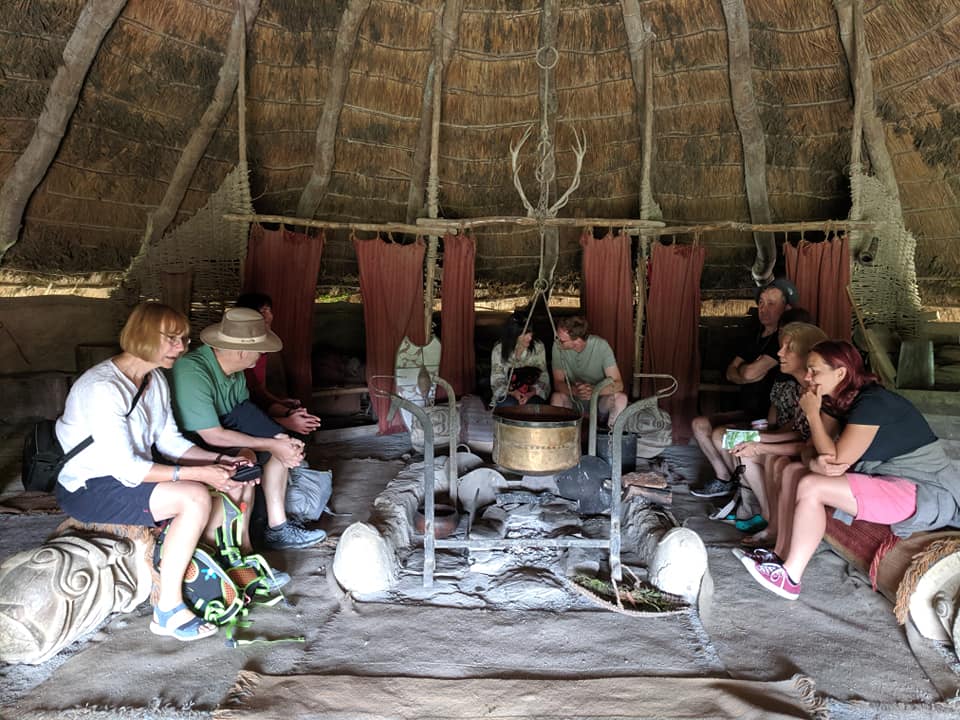
The original plan was to visit the cheese factory in Aberteifi, but because it happened to be closed, and there are quite a few Bwtcampers who either don’t or can’t eat dairy, we decided to spend an hour wandering around the town instead. At one of the Welsh shops, I bought a small pin featuring the Welsh and Canadian flags, as well as an award-winning novel by local author Manon Steffan Ros. Iestyn, Clare, Ben and I also stopped at Coffee #1 for a quick drink where I successfully described what I do for a living – a miracle since I have a terrible time explaining the life of a blogger in English, let alone Welsh!
Sadly we had to say goodbye to Nia in Aberteifi but we were greeted with Dee’s smiling face back at the Canolfan. While four bwtcampers went to practise a song for our upcoming Noson Lawen, the rest of us went out for a walk on the beach. While chatting to Dee, I discovered that she recently visited Turin (Italy), which is where I lived for nearly seven years. What’s more, she met up with an Italian lady who is learning Welsh through the SSIW method. It certainly is a small world!
Unsurprisingly no one was really in the mood to cook supper, so we jumped into the car and drove back to Aberteifi for Indian food. The restaurant was located by the harbour inside what looked like an abandoned boat, and there we had loads of laughs. The funniest “you-had-to be-there” moment was when Andrew randomly dubbed Deborah “Coral” (one of the many nicknames she’s received so far) and she called him a “planhigyn” (plant). I can’t remember the last time I had such a bad case of the giggles. Perhaps that’s why, when I turned around, there wasn’t anyone else left in the restaurant!
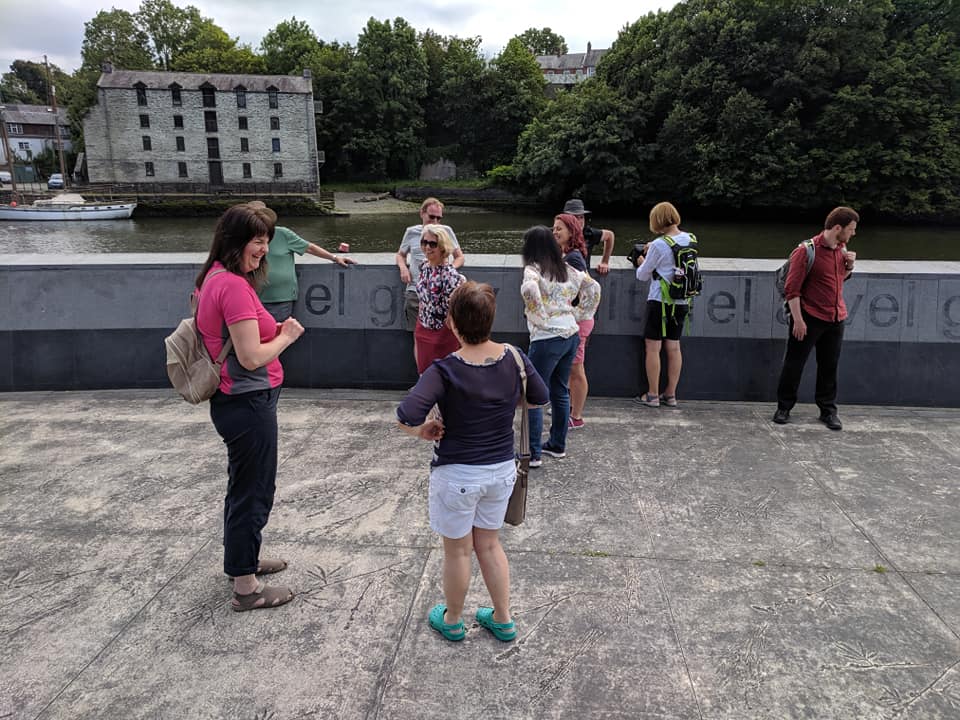
On a serious note though, I can’t believe how easy it was to immerse ourselves in Welsh in Aberteifi. I don’t recall hearing much English, and whenever I did happen to hear any, it sounded out of place, as if they were the tourists and we were the natives. I was also surprised by how many working people – from waiters to shopkeepers – have at least a good passive understanding of the language. It makes me wonder how easily I could get away with speaking Welsh in Tywyn with everyone I meet. 🤔
Day 6 – Llandysul and Noson Lawen
Because Iestyn and Cat had to attend their children’s Mabol Gampau (sports day) on Thursday, we all decided to tag along and try to speak Welsh with some of the parents. The unusually warm weather mixed with the sound of children cheering each other on brought back strong memories of my track and field days back in Canada, with the difference that parents weren’t invited to take part at my school. Curiously the predominant language I heard while walking around the school grounds was Welsh, whereas Deborah said she mostly heard English! Perhaps I was actually hearing English and subconsciously tricking myself into thinking it was Cymraeg?
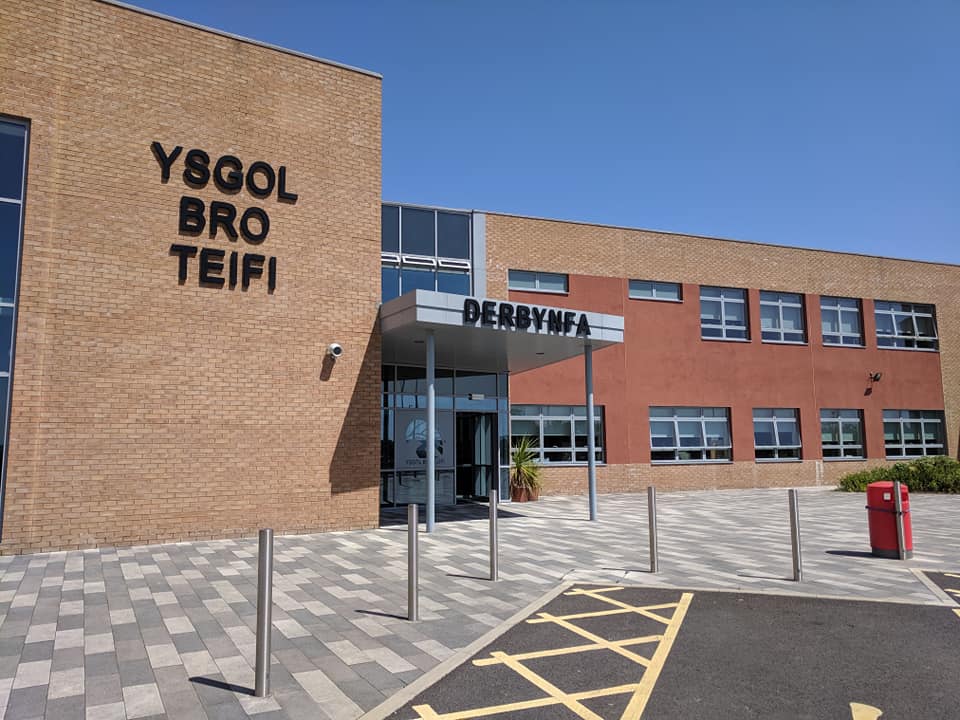
After that, we made a quick stop at Eglwys St Tysul where Iestyn gave us an interesting history lesson about the church and the area. It is supposed that Owain Glwyndwr lived in Llandysul and most likely attended the church with his parents when he was a boy. Also, when 11 days were lost on the change from the Julian to the Gregorian calendar in 1752, Llandysul was one of the only towns to resist, so to this day, they celebrate New Year’s Day twice – once on the 1st and once again on the Saturday closest to January 12th (Calan Hen). The things you learn when you’re at Bootcamp!
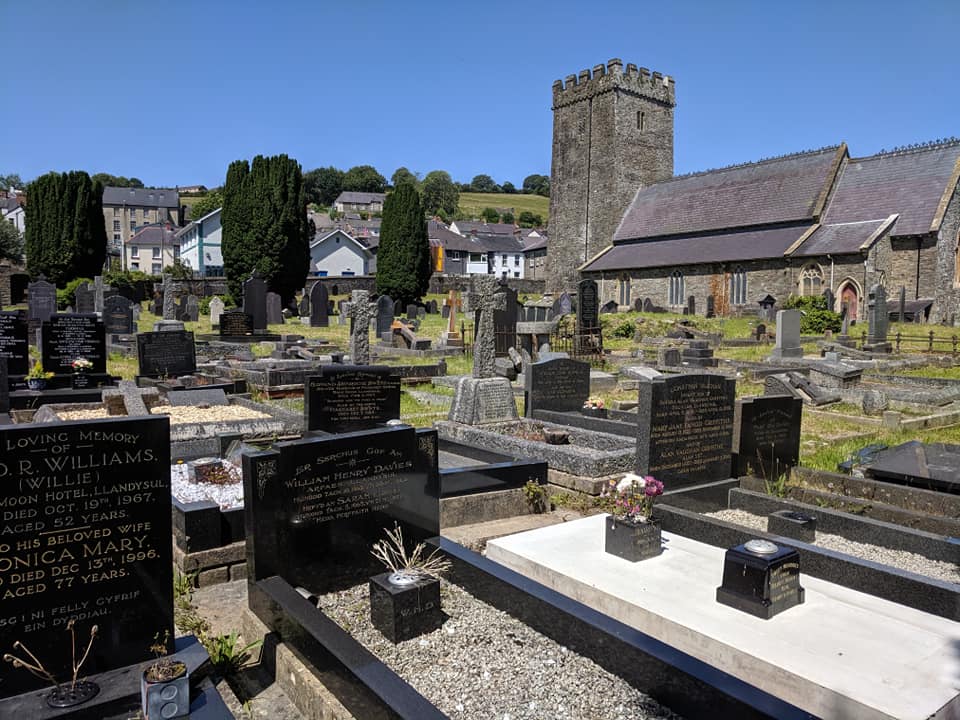
We ended our morning in Llandysul with a delicious lunch at the Chinese restaurant Simae (formally Dan’i Sang). To ensure that we didn’t hear English or any other language, we were served by one of the local Welsh tutors rather than a restaurant employee. It may sound odd, but it is these small details that really count towards making the Welsh immersion experience authentic.
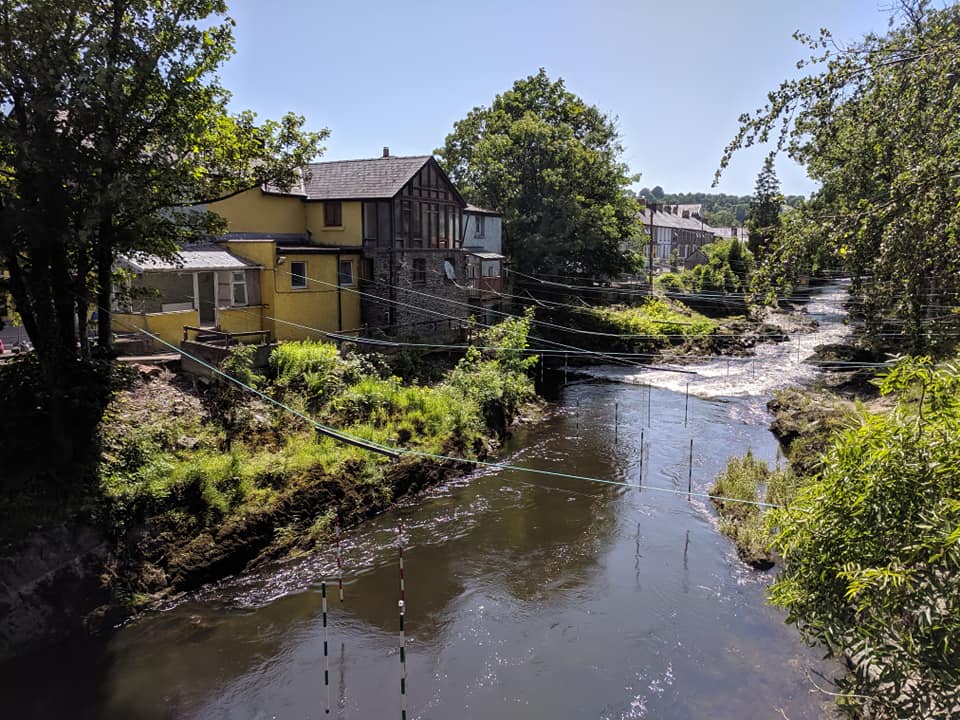
Back at the Canolfan, it was time for Noson Lawen – an afternoon of entertainment where anyone with a special talent (or zero talent at all!) can put on a performance. We all sang along to Andrew’s trumpet rendition of Calon Lan and Gwahoddiad, and had a good chuckle at Clare’s amusing monologue about winning the lottery. Iestyn and his two daughters serenaded us with a few traditional Welsh tunes including one of my favourites, Nant y Mynydd, while Ben accompanied Deborah and Lea on the guitar as they sang their own version of Calon Lan. I was almost going to get up and sing some Bwncath but I didn’t feel confident enough without any backing music. Ta waith!
The day ended with Kathryn, Lea and I taking a walk along a small section of the Wales Coastal Path to watch the sun set over the sea. We then joined Colin, Ben and Deborah at the pub for drinks and “sgwrsio” and had so much to talk about that we didn’t get back to the Canolfan until nearly 1 a.m. The best moment of the evening was when not one, not two, but three Welsh speakers approached us to say “diolch” for speaking their language. It was quite moving! Sadly Ben has to go home tomorrow because he is in the process of moving but for the rest of us, there is still one day to go before we return to the not-so-magical land of English… 😭
Day 7 – Aberteifi and Mwnt
Our last full day was fairly relaxed compared to previous days. We started out in Aberteifi once again, where a group of advanced learners were waiting to chat with us over tea, coffee (and a strawberry milkshake in my case) at Gorffwysfa’r Pysgotwyr. Many of them have been learning for years and exemplified just how fluent you can become if throw your heart and soul into learning another language.
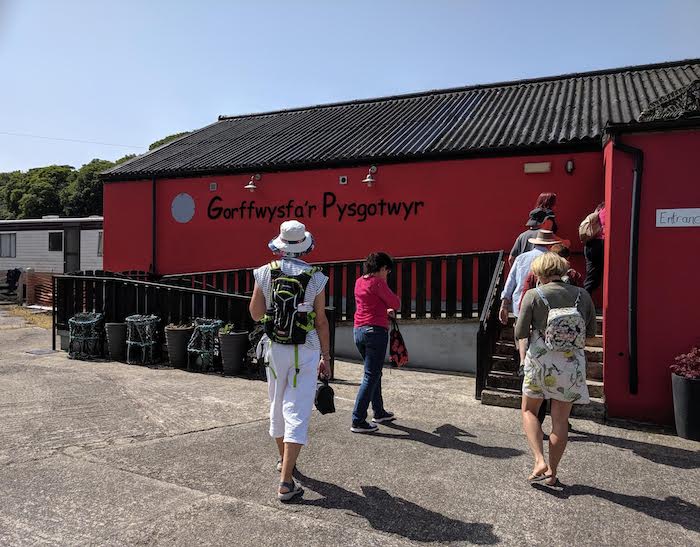
We then went to grab some fish and chips, but because the queue was rather long, Michelle and I opted to look for something else on the high street. After receiving a few funny looks inside an independent cafe, we ended up in Greggs where the two young servers were more than happy to take our order in Welsh. Normally a chain restaurant wouldn’t be my first choice but “siarad Cymraeg” takes priority!
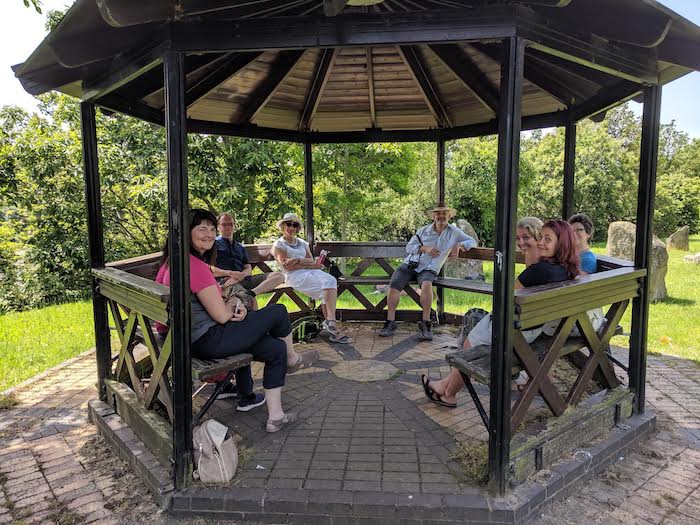
Once we’d said a bitter-sweet “hwyl” to Ben who had to catch a bus back home at 3 p.m., we drove on to a picturesque cove called Mwnt. By that time, the temperature had soared to nearly 30 degrees, leaving us no option but to paddle in the sea, and eventually, escape into the cool shelter of Eglwys y Grog, a small white church on the hilltop overlooking Mwnt. Deborah played us a lovely tune on the time-worn organ and Iestyn shared some of the church’s history before we set off back to Tresaith.
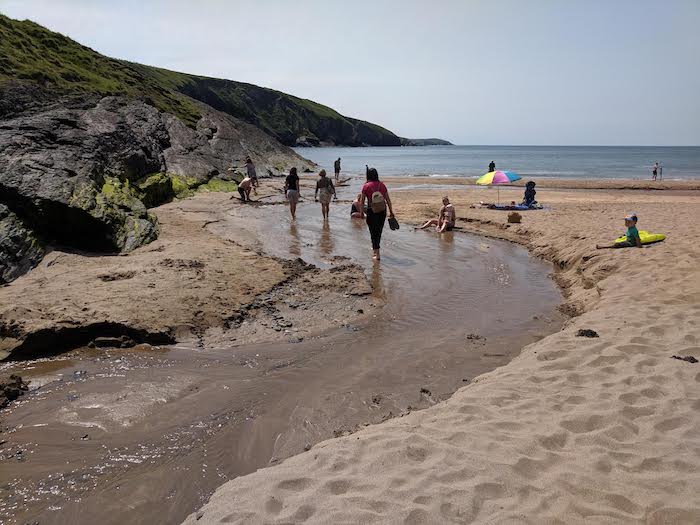
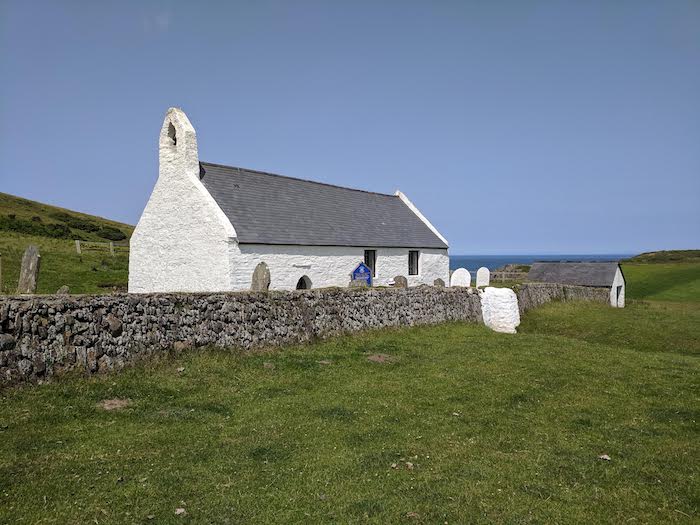
Normally only a handful of us go to the pub each evening, but being the final night, we all strolled down together and enjoyed a few drinks as the sun went down. We were all a little more subdued this time, perhaps because the thought of Bwtcamp’s imminent end was creeping up in the back of all our minds. Still, that didn’t stop the jokes from flying back and forth, mostly about me sounding like a Gog (northerner) and Deborah’s ever-growing list of names (Coral, Barbara, Deirdre…)!
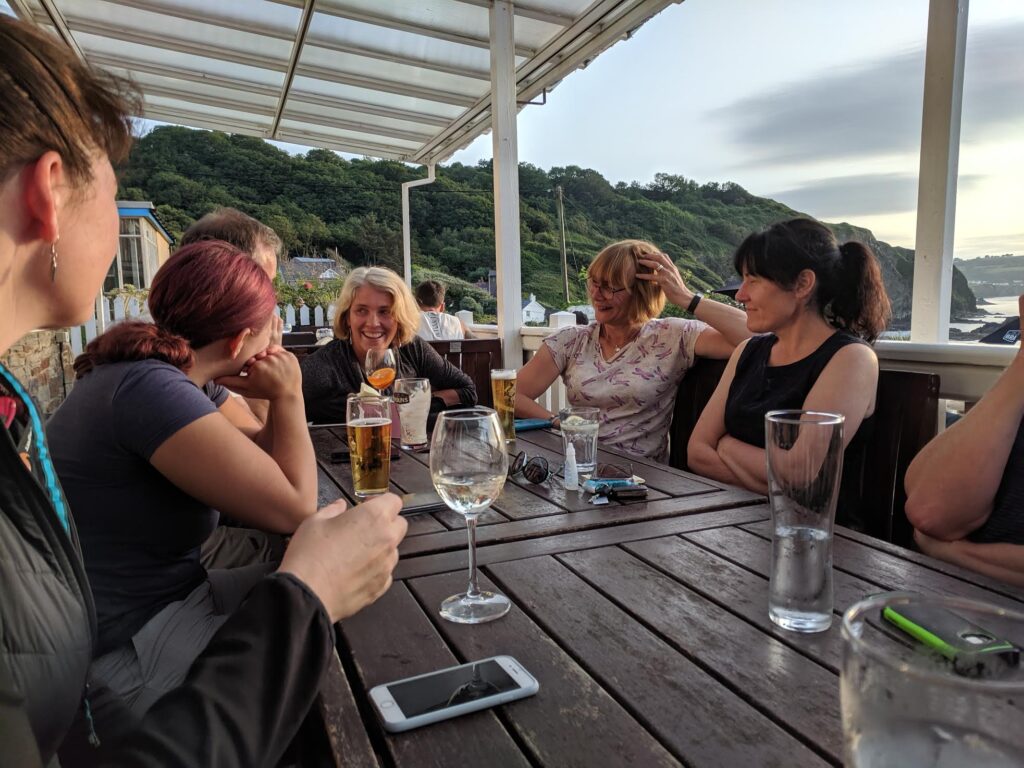
Day 8 – Back to Life, Back to Reality…
I had some trouble getting to sleep last night, in part because I was excited to see Mathieu but also because I knew I’d miss the company of my fellow bwtcampers and the Welsh-only world we’d created for ourselves. A week was definitely enough, but that hasn’t stopped me from feeling just a little sentimental about the whole experience. We’ve all exchanged emails and phone numbers, so I’m sure there will be many chances to meet in the future at Welsh language events and perhaps the Eisteddfod in Llanrwst.
All things considered, I cannot recommend the ‘Say Something in Welsh Bootcamp‘ highly enough to anyone who is serious about becoming fluent in Welsh. If you can already speak to some degree, it will get you speaking even more. If you can’t speak much at all, it will draw out the speaker within. In fact, I enjoyed it so much that I’m even considering taking part in a second Bootcamp next year if circumstances and time permit. In the meantime, I hope to nurture the confidence I’ve gained by using Welsh more within my little community, both with strangers and the people I know. 🏴
Finally I’d like to extend a huge “diolch” to Iestyn, Dee and Nia for investing so much time and energy into making Bootcamp a pleasure and a success. Gobeithio y bydda i’n eich gweld chi i gyd eto!

